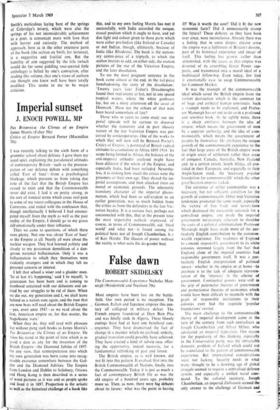Pax Britannica: the Climax of an Empire James Morris (Faber
50s)
Imperial sunset
J. ENOCH POWELL, MP
Critics of Empire Bernard Porter (Macmillan 70s) I was 'recently talking to the sixth form of a gramtriar school about defence. I gave them my usual spiel, explaining the paradoxical attitudes of contemporary Britain—such as the preoccu- pation of our defence debate with something called 'East of Suez'—from a psychological blockage, which prevents us from taking due note of the fact that the British Empire has ceased to exist and that the Commonwealth never did exist. I laid it on pretty strong, in the sort of ironical terms which cause real pain to some of my nicest colleagues in the House of Commons, and ended with the confession that, though intellectually I believed I had emanci- pated myself from the myth as well as the past reality of the Empire, I should go to my grave still emotionally under their influence.
Then we came to questions, of which there were plenty. Not one was about 'East of Suez' or the Empire at all. Nearly all were about the nuclear weapon. They had listened politely and closely to my passionate demolition of a dan- gerous national hallucination. Only it was a hallucination to which they themselves were evidently strangers and in which they felt no personal concern or interest.
I left that school a wiser and a gladder man. 'So at last it's happening,' said I to myself; 'a generation has been born and is coming to manhood untainted with our delusions and un- tired by our struggles to be rid of them. When we die out, my generation and I, we shall leave behind us a nation sane again, and the men that are now boys will read about the British Empire —yea, even unto 1947—as we read about the first, American empire or, for that matter, the Napoleonic wars.'
When they do, they will read with pleasure but without pang such books as James Morris's !I Pax Britannica: the Climax of an Empire. He takes his stand at the point of time which is as good a date as any for the invention of the British Empire—the Diamond Jubilee of 1897. On any view, that reinterpretation into which my own generation was born came into recog- nisable existence somewhere between the Gol- den and the Diamond Jubilees. The Empire from London and Dublin to Salisbury, Ottawa and Hong Kong is then described in a series of word pictures as it was and as people spoke and lived it in 1897. Proportion is the artistic as well as the historical challenge-of a book like
this, and to my own feeling Morris has met it successfully, with India accorded the unique, causal position which it ought to have, and yet due light and colour given to those parts which were either pre-Indian (like Ireland or Canada) or not Indian, though, ultimately, because of India (like Rhodesia). The book is the station- ary centre-piece of a triptych, to which the author intends to add, on either side, the motion pictures of the rise of the Victorian Empire, and the later dissolution.
To me the most poignant sentence in the book came almost at the end, in the tail-piece foreshadowing the story of the dissolution: 'Twenty years later Fisher's Dreadnoughts found their real enemy at last, not in any spiced tropical waters, where the white gunboats lay, but on a misty afternoon off the coast of Denmark.' Have not the echoes of that note been heard somewhere of late?
Those who in years to come study our im- perial episode will be curious to discover whether the transitory and in part illusory nature of the late Victorian Empire was per- ceived by contemporaries. One of the works to which they will turn will be Bernard Porter's Critics of Empire, 'a portrayal of British radical attitudes to colonialism in Africa 1895-19 14 ' Its scope being limited to Africa, the balance of the anti-imperial attitudes analysed might have been different if the whole of the Empire, and especially India, had been included. Neverthe- less, it is striking how much the critics were the prisoners of their own age. They shared the im- perial assumptions, and then attacked them on moral or economic grounds. The inherently transitory character of the imperial pheno- menon, which had been so self-evident to an earlier generation, was as much hidden from the critics as from the defenders in the late Vic- torian heyday. It is a curious fact, perhaps not unconnected with this, that at the present time the most imperialist outlook--expressed, of course, in terms of Commonwealth, aid, 'third world' and what not—is found among the political heirs not of Joseph Chamberlain, bit of Keir Hardie. The illusion of power without the reality is what suits the do-gooder best.


































 Previous page
Previous page